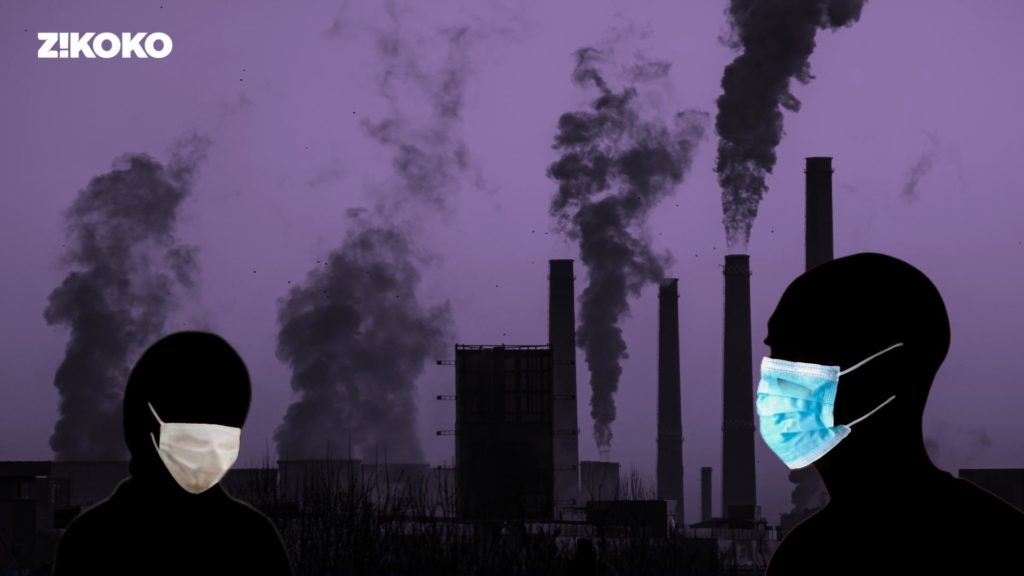In early 2016, Olaedo Elemuwa woke up to black soot covering every surface of her compound in Iwofe, Port Harcourt. She struggled to breathe, and for the rest of the day, sneezed out blackish mucus. Six years later, black soot still hangs over Port Harcourt like a cloud of impending doom.
How are Port Harcourt residents living with the health and environmental impacts of illegal oil refining in a city once nicknamed “The Garden City”?

“You wake up and check the time; it says 7 a.m. You look out the window, and it’s looking like 8 p.m.,” Elemuwa, who has lived all her life in Port Harcourt, says.
Port Harcourt is a major city in the Niger Delta, the country’s oil-producing region. As home to many petroleum companies, air pollution isn’t a stranger to the city and its residents. In the last six years, black soot has spread dramatically throughout the city due to the indiscriminate burning of crude oil during the illegal refining process by oil thieves and illegal bunkers.
In 2017, the Rivers State government set up a task force to combat the soot scourge. But the following year, Port Harcourt residents, frustrated that the promises had not yielded any tangible results, launched public protests under the hashtag #StoptheSoot.
A study by the Stakeholder Democracy Network estimates that Port Harcourt now houses five times the number of illegal refineries as it did five years ago. In that time, the total supply chain of illegally refined petroleum increased 24-fold.
But the government has tried a few things: Nigerian law enforcement and the military have raided illegal bunkers, burning hundreds of them in the process — albeit destructive actions which only further pollute the city.
So how are residents facing life under these conditions?
Nse-Obot Afaha, a university student at Rivers State University of Science and Technology, cleans her room multiple times daily and rarely wears white clothing. “If I wash my clothes and hang them outside, black soot quickly settles on them.” Blessing Awulotu, though, has a washing machine that spins her clothes almost dry. Then she spreads them in her sitting room.
Health professionals predict that if the soot situation persists, it could lead to life-threatening consequences for residents in the long term. AirVisual reports Port Harcourt’s particulate matter at PM2.5 concentration, 4.8 times above the WHO annual air quality guideline value. Continued exposure to such poor air quality greatly increases the risk of respiratory infections, heart disease and lung cancer. Doctors warn that more than six million Rivers State residents are at risk of such diseases.

Saviour, a Port Harcourt-based trader, tells me, “We are all smokers in this city. The only difference is that it’s soot we’re smoking.”
And while some residents have made lifestyle adjustments to live a little better, others have migrated — but everyone can’t leave their home.
Precious Nwadike, a senior nurse, has chosen to stay put after turning down an offer to move to Lagos in 2019. She doesn’t think Lagos is any better. ”It stinks and has a housing problem.” Uchechukwu* is in the second year of a four-year course at University of Port Harcourt. For Blessing mentioned earlier, she can’t just leave her booming businesses as she would have to start life afresh. Olaedo Elemuwa wants to leave the polluted city, but she would feel guilty leaving her family behind — she is especially concerned for her mother, who suffers bronchitis.
In January 2022, the Rivers State Government put a ₦2m bounty on each illegal refinery. Some alleged offenders have been caught — In January 2022, the Nigerian Navy arrested five suspected oil thieves after simultaneous raids. But despite the tough-talking by the state government, residents claim that the illegal business continues to boom, which makes them suspect that the state’s leadership is being lenient in tackling the menace.
“It’s not a secret,” a respondent who asked for anonymity says. “The governor does not need to promise anybody any money. We see these people every day and we know who they are. If the government wants to catch them; they know where to look.”
In January 2022, a video surfaced on Twitter showing officers of the Nigerian Police force attempting to resist efforts by the government to destroy an illegal bunkering site.
Some other residents claim that the same law enforcement agents tasked with nipping the situation in the bud are also being hired by illegal refiners. “So who will they be loyal to?” a resident of Akpajo asks.
“It’s organised crime. Even fuelling stations buy from the illegal refineries. Drivers charge these people heavily to transport the illegal petroleum products because they know what they’re carrying. These drivers pay off mobile policemen at checkpoints on the highway between Rivers and Imo state, I have witnessed this happen too many times on my inter-state trips,” he says.
In the face of peril, residents continue to go about their daily lives. Awulotu tells me that people generally don’t take the situation seriously. While there is the occasional outcry, people have to work to meet more pressing needs like their daily bread. After all, “Na person wey see food chop dey protest.”
Lack of proper sensitisation also poses a problem: many residents don’t understand the severity of the situation as the soot doesn’t have immediate consequences. “Most people don’t know how hazardous it is,” Awulotu says. “They just know that if e touch your nose, black something go comot. If you carry your leg enter house, everywhere go black.
“Because we’re not feeling any immediate effects on our skins, it looks like we can live with us. But I know we really can’t.”
Public health workers are convinced that there’s been a surge in respiratory and heart diseases cases in Rivers State in recent times. But a culture of poor record-keeping and tracking means it’s difficult to say for sure.
In January 2022, the Nigerian federal government promised to establish three modular refineries in the Niger Delta to halt the illegal petroleum refining activities and their impact on residents in the affected locations.
Meanwhile, Blessing Awulotu looks to the rainy season for temporary succour, as she claims heavy rains disrupt activities of the illegal refineries. Meantime, she’s masking up and hoping that sometime soon, the government will “do something.”




